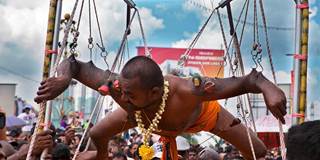Shock belts, spiked batons, and electrified thumbscrews can serve no other purpose than to inflict pain on people. But despite the fact that torture is prohibited by international law, goods such as these are still produced and sold, finding their way to buyers around the globe.
BUENOS AIRES/BRUSSELS/ULAN BATOR – Shock belts, spiked batons, and electrified thumbscrews can serve no other purpose than to inflict pain on people. But despite the fact that torture is prohibited by international law, goods such as these are still produced and sold, finding their way to buyers around the globe.
Likewise, at a time when more countries are abolishing capital punishment, the products used to carry out death sentences – such as lethal-injection systems, poison cocktails, electric chairs, and gas chambers – remain on the market. According to Amnesty International, nearly 19,000 people worldwide are awaiting execution, even though capital punishment has no proven effect as a deterrent and makes judicial errors irreversible.
If we in the international community are serious about ending torture and abolishing capital punishment, we must do more than make lofty promises. It is time for concrete action to make acquiring the means of execution and torture far more difficult.



BUENOS AIRES/BRUSSELS/ULAN BATOR – Shock belts, spiked batons, and electrified thumbscrews can serve no other purpose than to inflict pain on people. But despite the fact that torture is prohibited by international law, goods such as these are still produced and sold, finding their way to buyers around the globe.
Likewise, at a time when more countries are abolishing capital punishment, the products used to carry out death sentences – such as lethal-injection systems, poison cocktails, electric chairs, and gas chambers – remain on the market. According to Amnesty International, nearly 19,000 people worldwide are awaiting execution, even though capital punishment has no proven effect as a deterrent and makes judicial errors irreversible.
If we in the international community are serious about ending torture and abolishing capital punishment, we must do more than make lofty promises. It is time for concrete action to make acquiring the means of execution and torture far more difficult.